Sen. Warnock calls Democratic Caucus lunch “a very principled conversation”
From CNN’s Jessica Dean
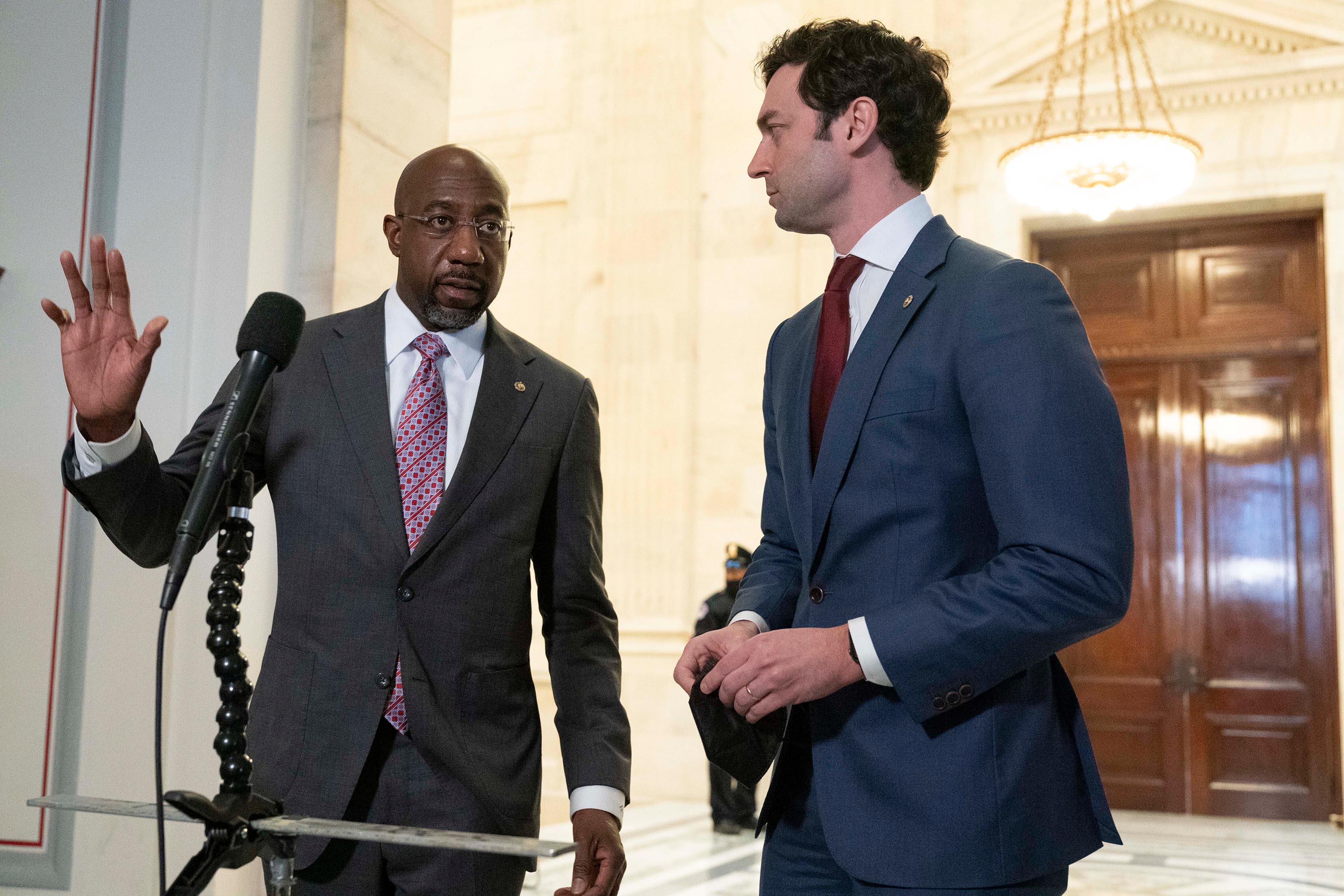
Sen. Raphael Warnock, who has played a leading role in the Democrats’ push for voting rights, would not talk specifics from today’s lunch but called it a “principled conversation.”
“This is a defining moment. I think everybody has to be heard on the record. We’ll keep talking to our colleagues and see what happens,” Warnock said when asked about the fact the voting rights bills look set to fail again.
Warnock also batted down the idea that if Democrats had tried to work harder with Republicans on this issue, they would have been more successful.
“We were blocked from having a debate on voting rights this year. And I think it’s important to emphasize that. What they blocked was our ability to even have a debate on the issue. They are not serious,” he said.
Schumer and Sinema decline to answer questions following Democratic Caucus lunch with Biden
From CNN’s Ted Barrett, Ali Zaslav and Morgan Rimmer
Senate Majority Leader Chuck Schumer delivered a brief statement following the Democratic Caucus lunch in the Senate with President Biden, but declined to answer questions.
He also refused to say, as he was getting on an elevator, if he would definitely go through with the nuclear option.
Sen. Kyrsten Sinema, a key moderate from Arizona who has reiterated she does not support changing filibuster rules, also declined to answer several reporter questions as she left the caucus meeting with Biden on Thursday, including whether Biden said anything to change her mind on the filibuster. Sinema directed the reporters to call her office.
During the meeting, Biden told fellow Democrats that “without voting rights, there are no rights,” according to Sen. Bob Menendez. Menendez also said Sen Joe Manchin, another key moderate, asked a question but declined to say what the question was. Sinema didn’t speak during the meeting, he said.
Biden on voting rights: I hope we can get this done, but I’m not sure
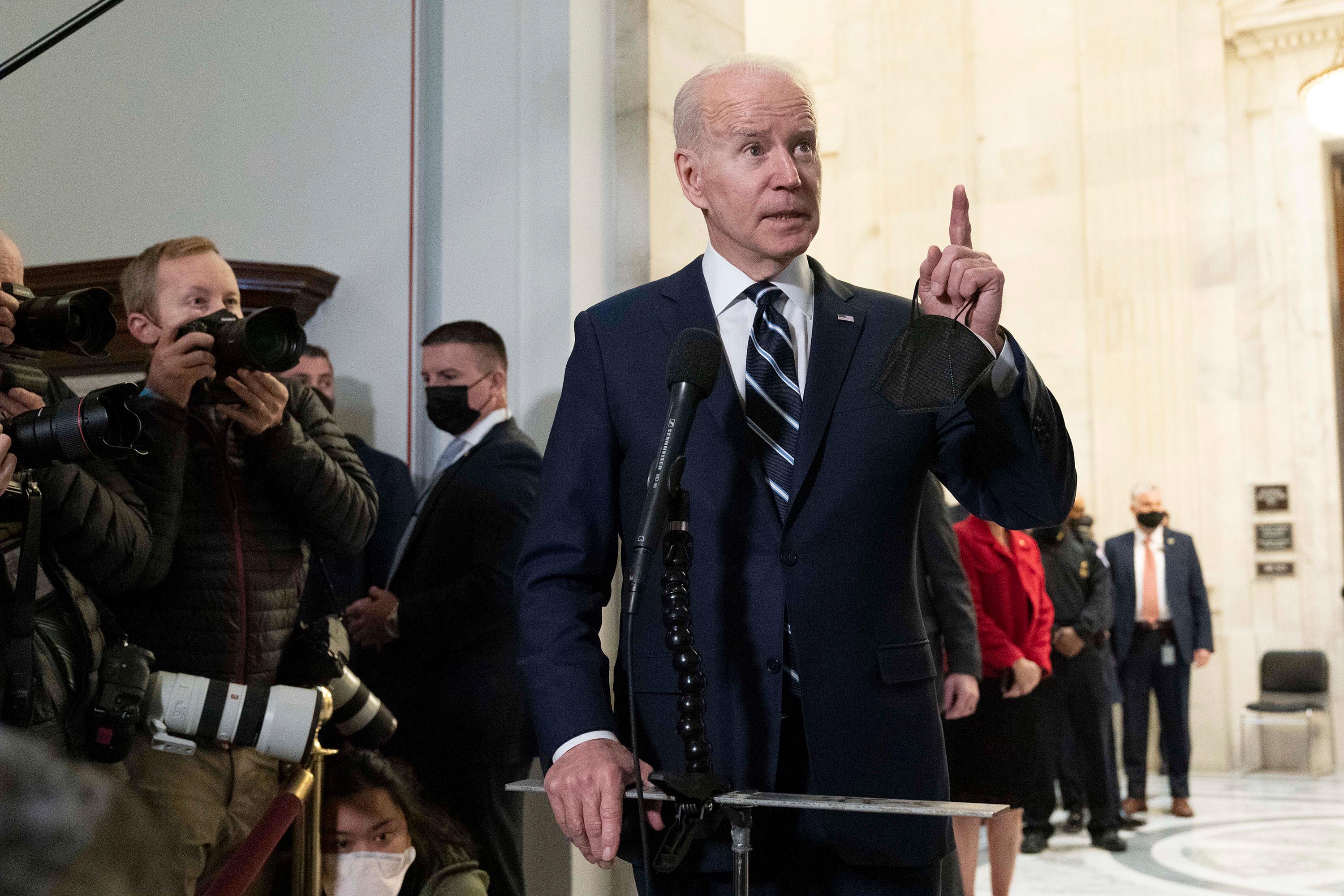
After meeting with lawmakers during a lunch on Capitol Hill, President Biden said he still hopes to pass voting rights legislation, but is not sure it can get done.
“I hope we can get this done. The honest-to-God answer is, I don’t know that we can get this done,” Biden told reporters.
“One thing for certain, like every other major civil rights bill that came along, if we miss the first time, we can come back and try the second time. … The state legislative bodies continue to change the laws not as to who can vote but who gets to count the votes. Count the vote. Count the vote,” Biden said, his voice rising at the end of his statement.
Biden pledged to remain focused on voting rights and fight for access to the ballot box as long as he is involved in politics.
“It’s about election subversion, not just whether or not people get to vote. … I don’t know that we can get it done, but I know one thing — as long as I have a breath in me, as long as I’m in the White House, as long as I’m engaged at all — I’m going to be fighting to change the way these legislatures have moved,” he added.
More background: Biden’s visit to the Capitol came shortly after Sen. Kyrsten Sinema of Arizona, a key moderate Democrat, reiterated that she will not support the so-called “nuclear option” to change filibuster rules, a positioned shared by fellow moderate Democrat Sen. Joe Manchin.
As CNN’s Lauren Fox has reported, Democrats are prepared to spend days voting and debating voting rights and changing Senate rules. But Sinema’s latest remarks show once again this effort by Senate Democratic leaders is not going to be successful.
Hear the President:
CNN’s Sam Fossum contributed reporting to this post.
Analysis: 19 states passed 34 laws that restrict voting in some way in the last year
From CNN’s Fredreka Schouten
Republicans aligned with former President Trump are pressing ahead at the state level to change voting procedures, conduct partisan investigations of the last presidential contest and seize more control over the machinery of elections.
Democrats and voting rights advocates warn that the unrelenting campaign to cast doubt on the legitimacy of President Biden’s 2020 victory over Trump could erode voter confidence in elections and increase the chances that losing candidates and their supporters will challenge the results of free and fair elections in the future.
“Every day that goes by, I am more and more concerned about the direction and resilience of American democracy,” said David Becker, executive director of the nonpartisan Center for Election Innovation & Research. “I’m worried that we are heading down a path where there are those who cannot accept that … their candidate could lose.”
Recent polling underscores the peril. A CBS News-YouGov poll found that more than six in 10 of Americans said they now expect violence over the loss of future presidential elections. And a separate poll from The Washington Post and the University of Maryland found that about one in three Americans think violent action against the government is sometimes justified.
The Post-UMD poll also exposed a stark partisan divide: 40% of Republicans and 41% of Independents said violence against the government could be justified versus 23% of Democrats.
In the last year, 19 states passed 34 laws that restrict voting in some way, according to an analysis by the liberal-leaning Brennan Center for Justice. And more changes are expected as state legislatures convene early this year.
Brennan’s analysis found 88 restrictive bills introduced last year will carry over into upcoming legislative sessions, and that 13 new bills had been pre-filed as of last month.
The new proposals include a measure that would ban the use of drop boxes in Georgia — where Biden became the first Democratic presidential candidate to win the state in 28 years. An Arizona lawmaker wants to establish stricter voter ID requirements.
Read more about where things stand on voting rights on the state level.
Biden is meeting with Senate Democrats now. These are the voting rights proposals being pushed in Congress
From CNN’s Fredreka Schouten and Clare Fornan
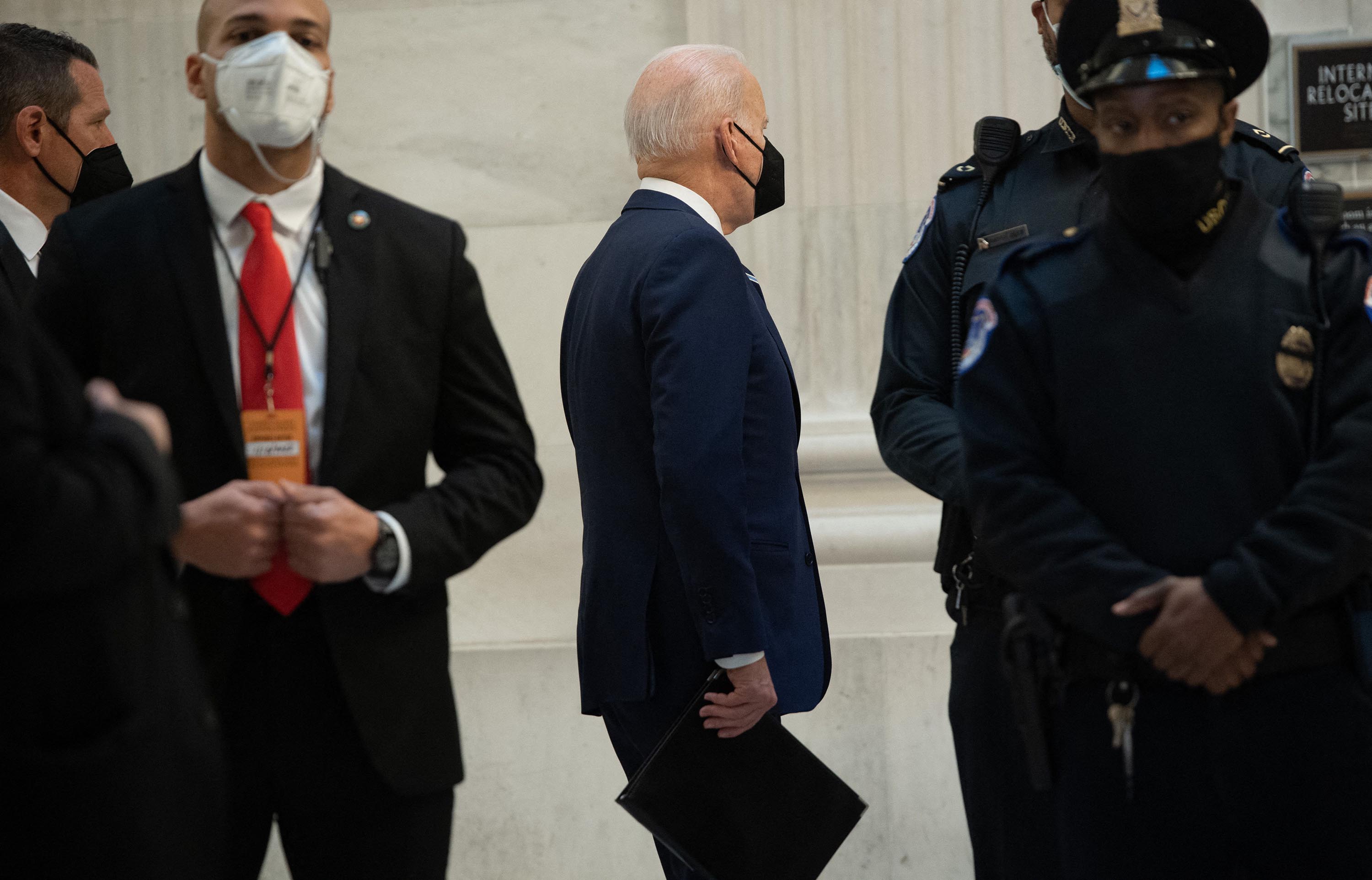
President Biden arrived on Capitol Hill this afternoon as he continues to push for passage of voting legislation in Congress, despite the uphill battle Democrats face amid Republican opposition and resistance within their ranks to changing Senate rules.
The Democratic-controlled House approved a measure that combined key provisions of two voting bills: the Freedom to Vote Act and the John Lewis Voting Rights Advancement Act. It will next be sent to the Senate, where a high-profile fight awaits.
There, Senate Majority Leader Chuck Schumer has set the stage for a showdown over voting rights — pledging to muscle through sweeping new federal legislation aimed at counteracting moves by Republicans in state capitols to restrict access to the ballot.
But to do so, he must accomplish a near-impossible feat and persuade reluctant senators in his own caucus to change the chamber’s rules to bypass the 60-vote threshold needed to overcome Republicans’ repeated blockades of the bills.
Despite supporting voting measures, two of his fellow Democrats — Arizona Sen. Kyrsten Sinema and West Virginia Sen. Joe Manchin — have defended the so-called filibuster, which requires 10 Republicans to support advancing legislation in an evenly divided 50-50 Senate.
Time is running out for Democrats, who are racing to establish new ground rules for voting ahead of this year’s midterm elections that will determine which party controls Congress.
Republican-controlled legislatures, particularly in battleground states that saw increased turnout and Democratic victories in 2020, already have enacted a raft of new laws that limit absentee balloting, impose additional ID requirements and otherwise create new hurdles to voting. And more restrictions are likely to pass in upcoming state legislative sessions.
Schumer has set a deadline of Martin Luther King Jr. Day on Jan. 17 to vote on rule changes if Republicans once again block consideration of the bills.
The looming confrontation comes as some GOP leaders have begun to voice support for a more modest approach: updating an arcane 19th century law, known as the Electoral Count Act, that details how Congress counts Electoral College votes from each state.
Schumer has insisted that an overhaul of the Electoral Count Act is no substitute for bigger electoral reforms.
As the Senate gears up to tackle voting rights, here’s a look at the various legislative proposals and what they would do:
The Freedom to Vote Act: This bill from a group of Democrats, including Manchin and Minnesota Sen. Amy Klobuchar, sweeps into one place broad changes to election and campaign-finance laws. The goal is to set baseline rules that all states must follow in administering federal elections.
Among its provisions: Making Election Day a public holiday, mandating same-day voter registration, guaranteeing that all voters can request mail-in ballots and restoring the federal voting rights for ex-felons once they are released from prison.
It also seeks to safeguard against partisan takeovers of election administration, ban partisan gerrymandering of congressional districts and mandate disclosure of donors to deep-pocketed “dark money” groups that seek to influence elections.
All 50 members of the Democratic caucus in the Senate back the bill; Republicans have rejected it as federal overreach.
The John Lewis Voting Rights Advancement Act: The bill, named for the late Georgia congressman and civil rights icon who died in 2020, would restore the power of the federal government to oversee state voting laws to prevent discrimination against minority voters.
A 2013 Supreme Court decision gutted a central pillar of the 1965 Voting Rights Act, which required nine states and parts of others with a history of racial discrimination to win approval or “preclearance” from the US Justice Department or a federal judge before changing their electoral policies.
Soon after the ruling, some states began enacting new voting laws, such as adding stricter voter identification requirements. And in the last year, Republican-led states have moved quickly to change more laws, spurred on by former President Donald Trump’s baseless claims that widespread voter fraud led to his 2020 loss.
The John Lewis bill would change the formula used to determine which states need to obtain “preclearance” for their voting rules. It would extend preclearance coverage to states that have incurred multiple voting rights violations during the previous 25 years — an attempt to address the Supreme Court majority’s concern that some states were being unfairly punished for decades-old misdeeds under the old law, rather than current discriminatory practices.
Alaska Sen. Lisa Murkowski is the only Senate Republican to sign on to the bill.
Read the full story and more about the bills here.
NOW: Biden arrives on Capitol Hill to make the case for voting rights
From CNN’s Clare Foran and Ted Barrett
President Biden arrived on Capitol Hill and is meeting with Senate Democrats to make the case for action on voting rights – a key priority for Democrats that faces major obstacles.
The President entered the Democratic Caucus meeting at the Capitol to standing applause. He did not respond to a few reporter questions on his way in.
Where things stand: The Democratic-controlled House approved a measure that combined key provisions of two voting bills: the Freedom to Vote Act and the John Lewis Voting Rights Advancement Act. It will next be sent to the Senate where a high-profile fight awaits amid Republican opposition and resistance among some Democrats to changing Senate rules.
Biden attending the Senate Democratic caucus lunch to discuss the effort to pass voting bills and potential changes to Senate rules, a senior Democratic aide told CNN.
But just prior to Biden’s arrival on the Hill, Democratic Sen. Kyrsten Sinema of Arizona reiterated her support for the filibuster, which sets up a 60-vote threshold for most legislation to pass in the Senate. In a speech on the Senate floor, she warned against further partisan division.
Sen. Manchin says floor speech by fellow moderate Sinema was “excellent”

Sen. Joe Manchin, a Democrat from West Virginia, praised fellow moderate Sen. Kyrsten Sinema’s speech, telling reporters it was, “Very good, excellent speech.”
“I think it’s the points that I’ve been making for an awful long time and she has too,” he said, when asked if he agrees with many of the points she made in her floor remarks.
Manchin also reiterated that he thinks “we need changes to make the Senate work better, not getting rid of the filibuster.”
Pool reporters in the chamber for Sinema’s speech report that on the Democratic side, only Sens. Dick Durbin and Jeff Merkley were in the chamber for her remarks. Durbin was watching intently throughout, while Merkley spent most of his time writing in a binder.
On the Republican side, Senate Minority Leader Mitch McConnell and Sens. John Thune, Susan Collins, Tom Cotton, Mitt Romney, Ben Sasse, Thom Tillis and Bill Hagerty were in attendance. Sen. Ted Cruz showed up halfway through, and Sen. Rand Paul also came in, but that was to prepare his speech, which followed Sinema’s.
Most Republicans appeared to be watching Sinema intently. Cotton spent a fair amount of time on his phone. Sasse also appeared to be taking notes and nodded occasionally, although that may have been unrelated to Sinema. Collins and Romney were the only ones masked, with Collins in a surgical mask and Romney in a black KN95.
After Sinema’s speech, she left the chamber quickly. A group of most of the Republicans huddled together briefly, and there was a lot of nodding.
CNN’s Manu Raju, Ted Barrett, Ali Zaslav contributed reporting to this post.
Key moderate Sen. Sinema reiterates she is not backing filibuster changes
From CNN’s Lauren Fox and Ali Zaslav
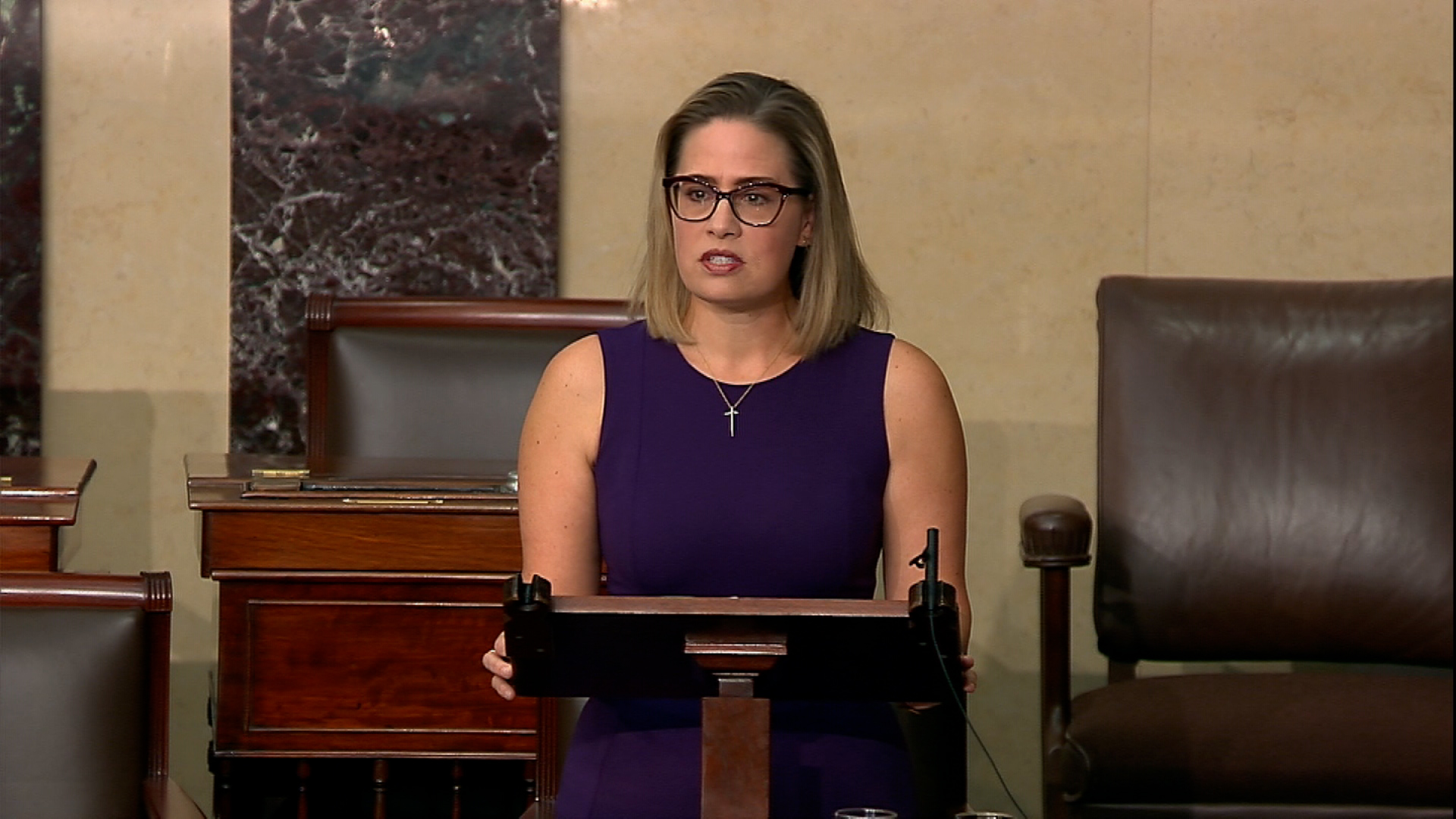
Less than an hour before President Biden arrives on Capitol Hill to pitch Democrats on eradicating the filibuster, Arizona Democrat Sen. Kyrsten Sinema, a key moderate, went to the Senate floor to reiterate she is not backing off her position to uphold it.
Sinema said eradicating the filibuster would not guarantee “that we prevent demagogues from being elected” and that getting rid of it would merely be treating the “symptom” of partisanship and not the underlying problem.
She said while she continues to strongly back Democrats’ election legislation, she will not support “separate actions that worsen the underlying disease of division infecting our country… There’s no need for me to restate my long standing support for the 60 vote threshold to pass legislation.”
“When one party need only negotiate with itself, policy will inextricably be pushed from the middle towards the extremes,” she added, noting that she does not support that outcome, and she knows “Arizonans do not either.”
Sinema acknowledged some states are passing laws that make it harder for voters to access the ballot box and also acknowledged she supports civil rights groups to challenge those laws in court. She said she will support voting rights’ bills coming from the House but said she is not going to back a change to the filibuster.
This comes as Democrats are prepared to spend days voting and debating voting rights and changing Senate rules. It shows once again this effort by Senate Democratic leaders is not going to be successful. The effort is futile.
Sinema argued the country needs a “sustained robust effort to defend American Democracy.” She outlined some ways to do this, including supporting state and local candidates who represent the values enshrined in our Constitution and ensuring “we have a judiciary that is less lopsided in its political leanings.” She also said that it is key the nation “confront and combat the rise of rampant disinformation.”
Schumer: Senate will face “critical and unavoidable question” on whether to protect democracy in days ahead
From CNN’s Ali Zaslav
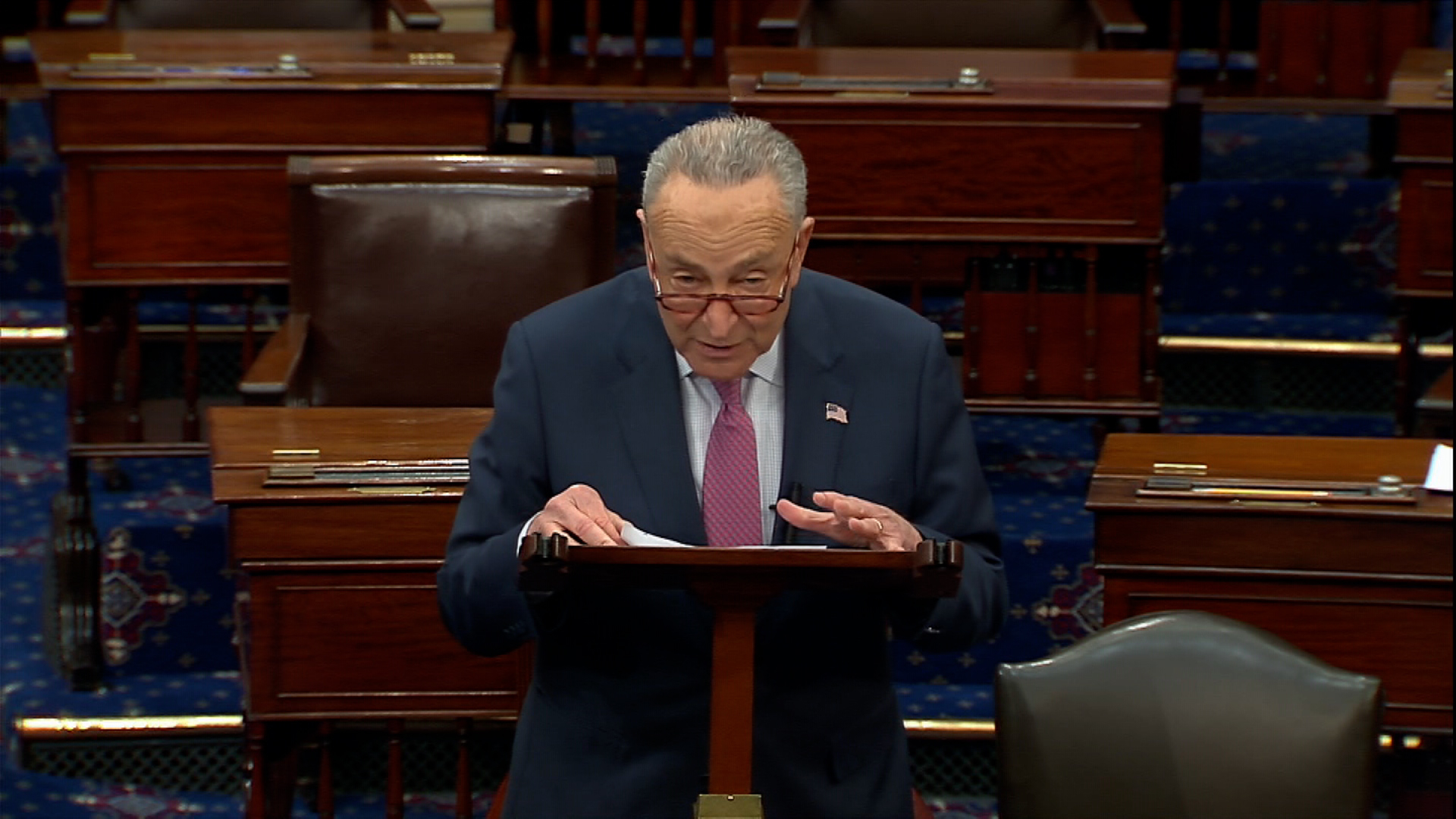
Ahead of President Biden’s visit to Capitol Hill later today, Senate Majority Leader Chuck Schumer argued that over the next few days the Senate “will face a critical and unavoidable question” on whether to protect democracy.
The House voted 220-203 to advance voting rights legislation this morning, but it is not expected to pass in the Senate as the GOP are likely to block it.
“We will be left with no choice but to consider changes to Senate rules so we can move forward,” Schumer reiterated.
“Changing Senate rules has been done many times before in this chamber,” he added. “This is not the first, second or third time that this is happening.”
As CNN’s Clare Foran reported, Democrats don’t have the votes to pass voting legislation under current Senate rules due to Republican opposition, and they don’t have the votes to change the rules.
Democratic moderate Sens. Joe Manchin of West Virginia and Kyrsten Sinema of Arizona, two influential moderates, have long expressed opposition to eliminating the 60-vote threshold.
Schumer defended President Biden and commended him for “offering a strong speech” and said he looks forward to him joining their caucus lunch later today, as the President has faced criticism over his words in Atlanta earlier this week.
“I commend President Biden for offering a strong speech, and I look forward to having him join Senate Democrats later today at our caucus meeting to discuss the path forward,” Schumer said in floor remarks.
The New York Democrat again laid out his plans for the chamber over the next few days, including what he expects to happen after the House vote.
“Then, the Senate will finally hold a debate on the voting rights legislation for the first time in this Congress, and every senator will be faced with a choice of whether or not to pass this legislation to protect our Democracy,” he said.
Here’s a look at Schumer’s steps to change the filibuster:
- House passes package with voting rights bills
- Senate votes with simple majority to start debate on voting rights bill
- Vote to break filibuster on voting rights bill if it fails
- Schumer moves to change filibuster rules
Read more about where things stand in Congress on voting here.



